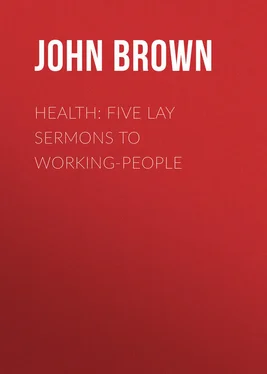John Brown - Health - Five Lay Sermons to Working-People
Здесь есть возможность читать онлайн «John Brown - Health - Five Lay Sermons to Working-People» — ознакомительный отрывок электронной книги совершенно бесплатно, а после прочтения отрывка купить полную версию. В некоторых случаях можно слушать аудио, скачать через торрент в формате fb2 и присутствует краткое содержание. ISBN: , Жанр: foreign_antique, foreign_prose, на английском языке. Описание произведения, (предисловие) а так же отзывы посетителей доступны на портале библиотеки ЛибКат.
- Название:Health: Five Lay Sermons to Working-People
- Автор:
- Жанр:
- Год:неизвестен
- ISBN:http://www.gutenberg.org/ebooks/37640
- Рейтинг книги:5 / 5. Голосов: 1
-
Избранное:Добавить в избранное
- Отзывы:
-
Ваша оценка:
- 100
- 1
- 2
- 3
- 4
- 5
Health: Five Lay Sermons to Working-People: краткое содержание, описание и аннотация
Предлагаем к чтению аннотацию, описание, краткое содержание или предисловие (зависит от того, что написал сам автор книги «Health: Five Lay Sermons to Working-People»). Если вы не нашли необходимую информацию о книге — напишите в комментариях, мы постараемся отыскать её.
Health: Five Lay Sermons to Working-People — читать онлайн ознакомительный отрывок
Ниже представлен текст книги, разбитый по страницам. Система сохранения места последней прочитанной страницы, позволяет с удобством читать онлайн бесплатно книгу «Health: Five Lay Sermons to Working-People», без необходимости каждый раз заново искать на чём Вы остановились. Поставьте закладку, и сможете в любой момент перейти на страницу, на которой закончили чтение.
Интервал:
Закладка:
When we are well, we perhaps think little about the Doctor, or we have our small joke at him and his drugs; but let anything go wrong with our body, that wonderful tabernacle in which our soul dwells, let any of its wheels go wrong, then off we fly to him. If the mother thinks her husband or her child dying, how she runs to him, and urges him with her tears! how she watches his face, and follows his searching eye, as he examines the dear sufferer; how she wonders what he thinks, – what would she give to know what he knows! how she wearies for his visit! how a cheerful word from him makes her heart leap with joy, and gives her spirit and strength to watch over the bed of distress! Her whole soul goes out to him in unspeakable gratitude when he brings back to her from the power of the grave her husband or darling child. The Doctor knows many of our secrets, of our sorrows, which no one else knows, – some of our sins, perhaps, which the great God alone else knows; how many cares and secrets, how many lives, he carries in his heart and in his hands! So you see he is a very important person the Doctor, and we should do our best to make the most of him, and to do our duty to him and to ourselves.
A thinking man feels often painfully what a serious thing it is to be a doctor, to have the charge of the lives of his fellow-mortals, to stand, as it were, between them and death and eternity and the judgment-seat, and to fight hand to hand with Death. One of the best men and greatest physicians that ever lived, Dr. Sydenham, says, in reference to this, and it would be well if all doctors, young and old, would consider his words: —
"It becomes every man who purposes to give himself to the care of others, seriously to consider the four following things: First , That he must one day give an account to the Supreme Judge of all the lives intrusted to his care. Secondly , That all his skill and knowledge and energy, as they have been given him by God, so they should be exercised for his glory and the good of mankind, and not for mere gain or ambition. Thirdly , and not more beautifully than truly, Let him reflect that he has undertaken the care of no mean creature, for, in order that we may estimate the value, the greatness of the human race, the only begotten Son of God became himself a man, and thus ennobled it with his divine dignity, and, far more than this, died to redeem it; and Fourthly , That the Doctor, being himself a mortal man, should be diligent and tender in relieving his suffering patients, inasmuch as he himself must one day be a like sufferer."
I shall never forget a proof I myself got twenty years ago, how serious a thing it is to be a doctor, and how terribly in earnest people are when they want him. It was when cholera first came here in 1832. I was in England at Chatham, which you all know is a great place for ships and sailors. This fell disease comes on generally in the night; as the Bible says, "it walks in darkness," and many a morning was I roused at two o'clock to go and see its sudden victims, for then is its hour and power. One morning a sailor came to say I must go three miles down the river to a village where it had broken out with great fury. Off I set. We rowed in silence down the dark river, passing the huge hulks, and hearing the restless convicts turning in their beds in their chains. The men rowed with all their might: they had too many dying or dead at home to have the heart to speak to me. We got near the place; it was very dark, but I saw a crowd of men and women on the shore, at the landing-place. They were all shouting for the Doctor; the shrill cries of the women, and the deep voices of the men coming across the water to me. We were near the shore, when I saw a big old man, his hat off, his hair gray, his head bald; he said nothing, but turning them all off with his arm, he plunged into the sea, and before I knew where I was, he had me in his arms. I was helpless as an infant. He waded out with me, carrying me high up in his left arm, and with his right levelling every man or woman who stood in his way.
It was Big Joe carrying me to see his grandson, little Joe; and he bore me off to the poor convulsed boy, and dared me to leave him till he was better. He did get better, but Big Joe was dead that night. He had the disease on him when he carried me away from the boat, but his heart was set upon his boy. I never can forget that night, and how important a thing it was to be able to relieve suffering, and how much Old Joe was in earnest about having the Doctor.
Now, I want you to consider how important the Doctor is to you. Nobody needs him so much as the poor and laboring man. He is often ill. He is exposed to hunger and wet and cold, and to fever, and to all the diseases of hard labor and poverty. His work is heavy, and his heart is often heavy, too, with misery of all kinds, – his heart weary with its burden, – his hands and limbs often meeting with accidents, – and you know if the poor man, if one of you falls ill and takes fever, or breaks his leg, it is a far more serious thing than with a richer man. Your health and strength are all you have to depend on; they are your stock-in-trade, your capital. Therefore I shall ask you to remember four things about your duty to the Doctor, so as to get the most good out of him, and do the most good to him too.
1st , It is your duty to trust the Doctor;
2dly , It is your duty to obey the Doctor;
3dly , It is your duty to speak the truth to the Doctor, the whole truth, and nothing but the truth; and,
4thly , It is your duty to reward the Doctor.
And so now for the first . It is your duty to trust the Doctor, that is, to believe in him. If you were in a ship, in a wild storm, and among dangerous rocks, and if you took a pilot on board, who knew all the coast and all the breakers, and had a clear eye, and a firm heart, and a practised hand, would you not let him have his own way? would you think of giving him your poor advice, or keep his hand from its work at the helm? You would not be such a fool, or so uncivil, or so mad. And yet many people do this very same sort of thing, just because they don't really trust their Doctor; and a doctor is a pilot for your bodies when they are in a storm and in distress. He takes the helm, and does his best to guide you through a fever; but he must have fair play; he must be trusted even in the dark. It is wonderful what cures the very sight of a doctor will work, if the patient believes in him; it is half the battle. His very face is as good as a medicine, and sometimes better, – and much pleasanter too.
One day a laboring man came to me with indigestion. He had a sour and sore stomach, and heartburn, and the water-brash, and wind, and colic, and wonderful misery of body and mind. I found he was eating bad food, and too much of it; and then, when its digestion gave him pain, he took a glass of raw whiskey. I made him promise to give up his bad food and his worse whiskey, and live on pease-brose and sweet milk, and I wrote him a prescription, as we call it, for some medicine, and said, "Take that , and come back in a fortnight and you will be well." He did come back, hearty and hale; – no colic, no sinking at the heart, a clean tongue, and a cool hand, and a firm step, and a clear eye, and a happy face. I was very proud of the wonders my prescription had done; and having forgotten what it was, I said, "Let me see what I gave you." "O," says he, "I took it." "Yes," said I, "but the prescription." " I took it , as you bade me. I swallowed it." He had actually eaten the bit of paper, and been all that the better of it; but it would have done him little, at least less good had he not trusted me when I said he would be better, and attended to my rules.
So, take my word for it, and trust your Doctor; it is his due, and it is for your own advantage. Now, our next duty is to obey the Doctor. This you will think is simple enough. What use is there in calling him in, if we don't do what he bids us? and yet nothing is more common – partly from laziness and sheer stupidity, partly from conceit and suspiciousness, and partly, in the case of children, from false kindness and indulgence – than to disobey the Doctor's orders. Many a child have I seen die from nothing but the mother's not liking to make her swallow a powder, or put on a blister; and let me say, by the by, teach your children at once to obey you, and take the medicine. Many a life is lost from this, and remember you may make even Willie Winkie take his castor-oil in spite of his cries and teeth, by holding his nose , so that he must swallow.
Читать дальшеИнтервал:
Закладка:
Похожие книги на «Health: Five Lay Sermons to Working-People»
Представляем Вашему вниманию похожие книги на «Health: Five Lay Sermons to Working-People» списком для выбора. Мы отобрали схожую по названию и смыслу литературу в надежде предоставить читателям больше вариантов отыскать новые, интересные, ещё непрочитанные произведения.
Обсуждение, отзывы о книге «Health: Five Lay Sermons to Working-People» и просто собственные мнения читателей. Оставьте ваши комментарии, напишите, что Вы думаете о произведении, его смысле или главных героях. Укажите что конкретно понравилось, а что нет, и почему Вы так считаете.












